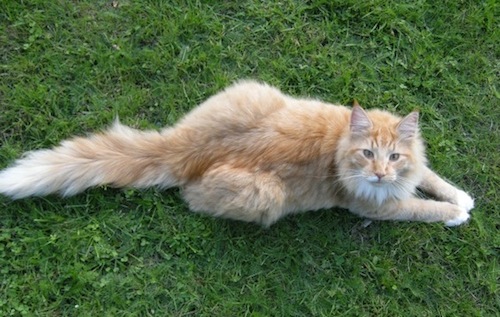Farewell, Copernicus
Andrew and I are sad to announce that the beloved Kitten Copernicus—better known as Copernicat to many—died suddenly early Friday morning January 20, 2012, at the emergency vet’s. He was our 2.5-year-old Norwegian Forest Cat who loved nothing better than to be as close to me as possible and to lick my nose—when he wasn’t busy trying to realize his ambitions of becoming Top Cat or running around the neighbourhood being admired (or envied, in the case of the foxes). He was Co-PURRRRRRR-ni-cat by name and purr-laden by nature.
He was amazingly stunning with his cinnamon-striped colouring and matching amber eyes. Andrew picked him out special for me, making us travel all the way to Wales to bring him and his brother Galileo home. Many people have met him by visiting our house, seen pictures of him, or heard me scolding him or being exasperated when he tried to cuddle up on my lap or in front of my keyboard while I was occupied. He knew his name and would usually come home when I called “Co-purrrr-ni-cussss” in my special way out into the neighbourhood.
Although fairly young, he had a well-developed unique personality. He was the first cat I’d ever heard whine like a dog (thankfully, we mostly trained him out of it) or chirp like a bird. He wasn’t the amazing explorer or the fantastic hunter like his brother, but he was smart and certainly held his own, on the ground and in the trees. He was incredibly sprawly. We thought he was confused about his species (bird, dog, person?), because he would lie on his back, completely stretched out. It seemed so uncatlike.
We had some scares along the way. His brother Galileo was the first to be lost, not long after we brought them home, gone for over a week. Last January, Copernicus didn’t come home one afternoon or one evening, despite calling for him. This was unusual, as both cats have been trained to come back when called and when it’s dark. Many days later, I was out walking outside, calling for him, when I heard a faint meowing. I eventually tracked it down to a garage. He’d somehow managed to get himself locked into one of the garages arranged in rows across from our house. We didn’t know whose it was, so I was pushing water on a Tupperware™ lid under the crack and food the same way.
When we eventually freed him, he started rapidly losing weight and we had our first big health scare. He dropped several kilograms very rapidly and completely stopped eating. We had to give him a different kind of cat food for every meal. Something about it wasn’t tasting right to him and he’d eat one and then not want to eat it again. Between a Friday when we took him to the vet and the Monday we returned for blood tests, he became severely jaundiced. It turned out he had some kind of bacterial liver infection. He recovered rapidly with antibiotics and soon regained his lost weight and then some in order to continue his adventures as wannabe Top Cat.
He was destined not to recover from this January’s crisis. He was at the vet’s with his brother on Tuesday for his annual check-up and vaccinations. He was a tad listless but basically OK. After returning from the vet’s, he was listless for the next several days, not eating and drinking very little. I thought it was either a cat flu (Kitty 2 had been ill some months back) or a reaction to the vaccination. On Thursday evening, he seemed perkier. He was sprawling out, purring, and bright-eyed. He spent most of the evening cuddled up with me on the bed as I worked, before he went downstairs to jump up on the couch. Around 01:30, just as we were about to go to sleep, we heard anguished, almost human, cries from downstairs. Copernicus was obviously in pain. He was panting rapidly, with his mouth open, and a bit of drool and, alarmingly, his back legs wouldn’t properly support him. We rushed off as quickly as possible by taxi to closest emergency vet service. We left him there to be given antibiotics, intravenous fluids to combat the mild dehydration, and pain relief.
We know now, although we didn’t then, that it was actually very serious. He had a blood clot in the artery where it splits off to nourish his back legs and tail. This was likely caused by an enlarged left heart chamber. He had not previously had heart problems or any sign of heart problems, but the breed, like Maine Coons and Ragdolls, shares a disposition to a particular type of heart problem. The prognosis for cats with blood clots is not good, even if they receive appropriate and quick medical attention. He apparently died not long after we left, without us, and without us saying “goodbye”.
If I had to admit it, he was my favourite of our four cats. The sudden loss leaves a big hole in our lives, for he was much loved and will be greatly missed. I hope he has the outdoors, someone to go for walks with, and love wherever he is now, even if only in our memories.
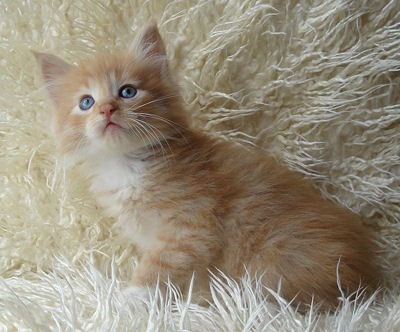
Image: The first picture we ever saw of Copernicus. This is the one that made Andrew pick Copernicus out special for me. He’s about 6 weeks old.
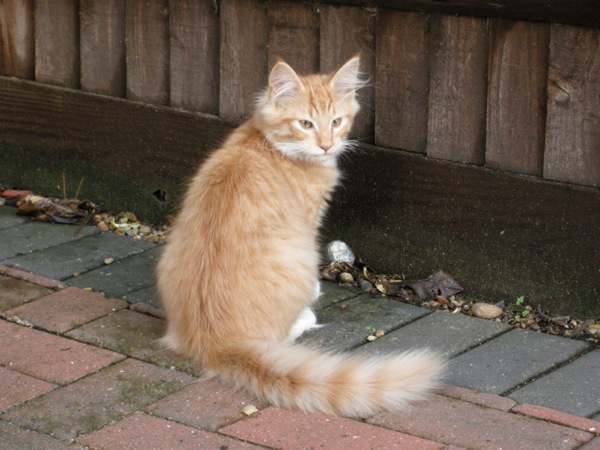
Image: Copernicus poses in our back garden. This is my favourite picture of him, as you can see his full body, his face, and his eyes. It was the lock screen on my iPad. November, 2009. He’s about 5 months old.
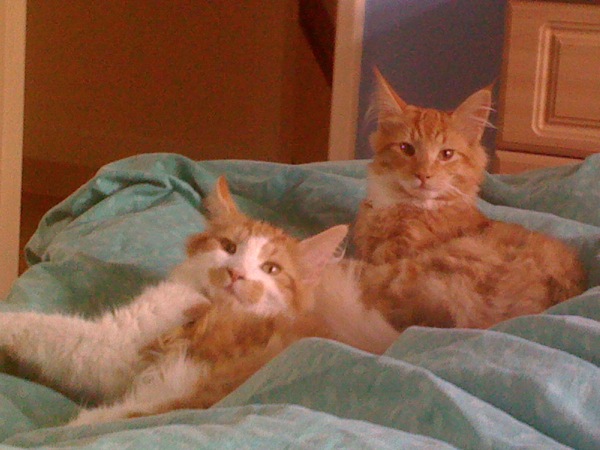
Image: Copernicus and Galileo. Two brothers together on our bed. January, 2010. They’re about 6 months old.
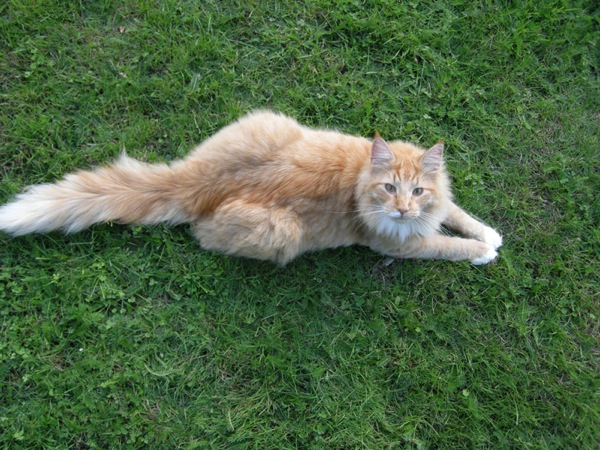
Image: Copernicus posing in the grass behind our house. He’s huge, isn’t he, but so strikingly attractive. September, 2010. He’s 1.25 years old.
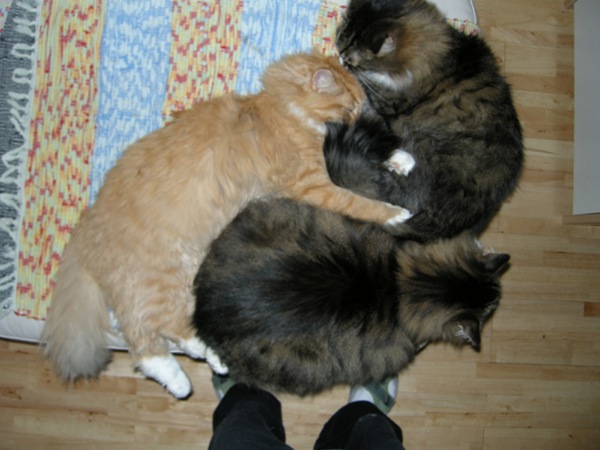
Image: Copernicus cuddled up with Kitty 1 and Kitty 2 for a change, being Mr. Nice Cat. November, 2010. Just shy of 1.3 years old.
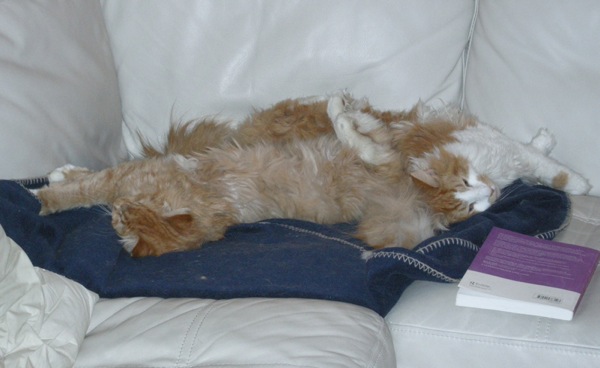
Image: Copernicus and Galileo sprawled out together on the couch. February, 2011. This will be after the great liver scare. He’s just over 1.5 years old.
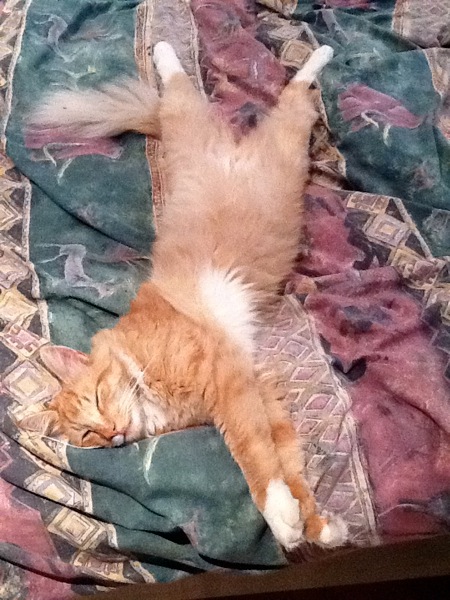
Image: Copernicus loved to sprawl. Here he’s sprawling on our bed and I caught him with the iPhone camera. June, 2011. He’s just shy of 2 years old.
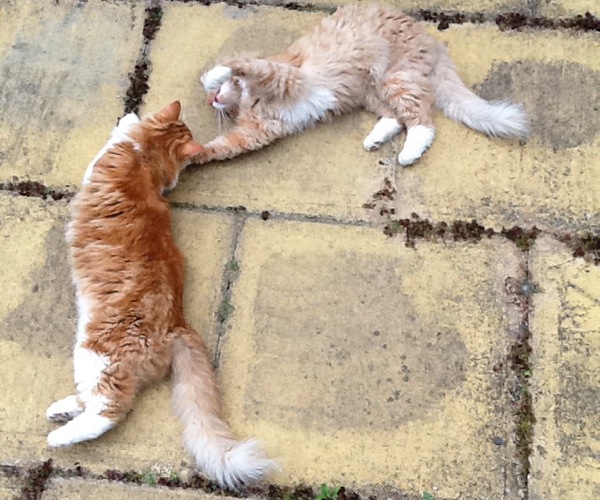
Image: Copernicus and Galileo on the former very ugly front paving stones. August, 2011. They’re 2 years old. This is the most recent picture we have of him.
All photos: Michelle A. Hoyle under an Attribution-ShareAlike 3.0 Generic license
(except 6-week kitten picture that is ©2009 by Jeanette Hughes of Normagikatt.)




